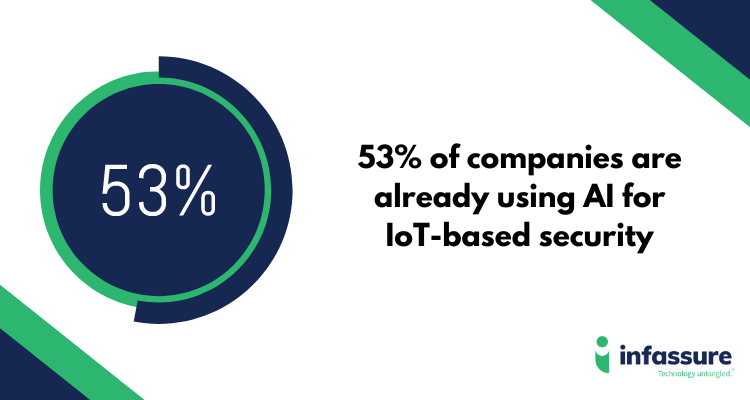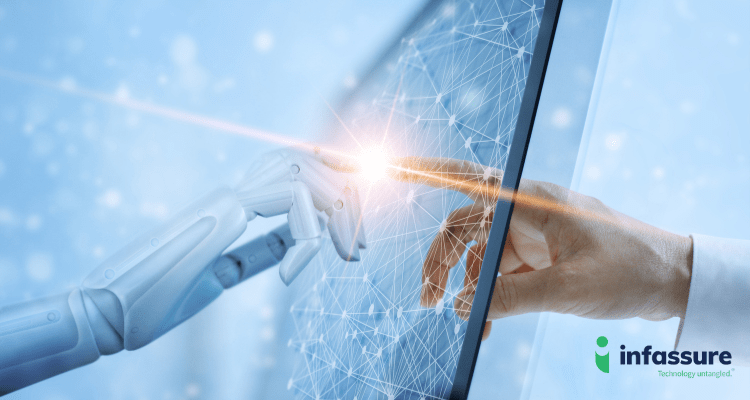(Updated November 6, 2025)
Let Infassure walk you through AI in surveillance systems.
Infassure designs and installs AI surveillance systems for businesses. AI camera surveillance uses machine learning and advanced algorithms to help businesses mitigate threats, monitor risks in real time, and minimize vulnerabilities more effectively than traditional security camera systems. Infassure offers commercial security camera system expertise for Dallas, Houston and nationwide.
In the security sector , intelligent tools powered by machine learning and advanced AI algorithms can give business leaders an opportunity to mitigate potential security threats, monitor risks in real time, and minimize various forms of risk.
Already, studies show around 73% of enterprises are using security products with some form of embedded intelligence. As risks continue to evolve in the modern business world, security camera solutions powered by AI will grow even more valuable.
The right AI security camera system transforms passive security systems into proactive, intelligent devices. Features such as smart motion detection and artificial intelligence video analytics optimizes safety, management, and more.
Request a quote for your AI surveillance system today. Infassure’s team can help with design, installation, training, and maintenance.
AI Security Camera and Technology
On a broad scale, artificial intelligence (AI) is a term that refers to machines, software, or technology capable of performing tasks that would typically require human intelligence. These tasks often include demands for learning, reasoning, perception, and problem-solving. Unlike conventional technologies, an AI security camera can process and analyze data with exceptional accuracy, and learn from experience.
Experts predict by 2029 that AI security solutions will reach a value of $60.24 billion . In the commercial security industry, AI powered surveillance can support a range of functions and uses such as optimizing video surveillance (with AI features ).
While there are various types of AI security solutions, most include similar components including:
- Machine learning algorithms: Technology which enables a computer system to learn from data, improve its performance over time, and make predictive decisions.
- Smart motion detection: Smart intrusion detection and live remote footage can reduce false alarms and increase on-time detection.
- Video analytics: Analytical capabilities in an AI system allow the technology to process and understand data, often to predict future events, or provide insights into risks.
- Data processing: AI technology can process vast amounts of data much faster than human operators. It can even analyze images, like a person’s face, or examine trends.
How AI Improves Surveillance and Security
Artificial intelligence is transforming how businesses monitor and protect their facilities. AI in surveillance systems brings automation, accuracy, and speed to every layer of security.
Key advantages include:
- Automated threat detection: AI identifies unusual motion, faces, or license plates instantly.
- Real-time alerts: The system notifies security personnel or triggers alarms without delay.
- Fewer false positives: Algorithms learn normal activity patterns and reduce unnecessary alerts.
- Smarter analytics: AI provides valuable data on traffic flow, employee movement, and safety compliance.
- Remote access: Teams can view live footage and review events from any connected device.
Infassure installs AI-powered surveillance systems that detect incidents in real time, streamline investigations, and keep businesses protected around the clock. Artificial intelligence can help your current security team and traditional surveillance systems.
Applications of AI Surveillance Cameras in Commercial Security
In today’s world of digital transformation, innovators are constantly discovering new applications and opportunities for artificial intelligence. AI technology enables operators and business leaders to respond to potential threats faster than ever, and implement strategies for proactive security.
Because these systems can grow more intelligent over time, thanks to machine learning algorithms, their value increases consistently. What’s more, artificial intelligence solutions are highly versatile. They can be incorporated into all kinds of security solutions, from access control systems to alarm systems, CCTV security cameras, and fire detection systems.
Just some of the most exciting applications for AI security include:
Video Surveillance and Facial Recognition
In the video surveillance industry, the use of AI security camera systems allows companies and operators to analyze video footage accurately in real-time. Using computer vision technologies, deep learning algorithms, and machine learning, these solutions can spot unusual activities in an instant, allowing for real-time monitoring and threat analysis.
Biometric technologies also allow AI security cameras to swiftly identify individuals based on facial recognition components. These surveillance cameras can distinguish between objects and people, and even track the movements of certain people around an environment.
Access Control Systems
In access control systems, biometric technology powered by AI is one of the fastest-growing segments. In an access control system, AI technology can examine data in the form of fingerprints, iris scans, and facial characteristics to identify people with the right to enter a building.
This can allow for a more efficient and secure way to manage access control without the need for traditional keycards and passwords. AI can use biometrics to minimize disruption in fast-paced environments like healthcare and industrial industries. Plus, AI can be trained to adjust access controls based on factors like the time of day, or current threat levels.
Intrusion Detection and Prevention
AI powered security cameras can be highly adept at learning “normal” patterns of behavior in specific environments, using deep learning algorithms. They can be trained to learn and understand which actions are safe, and which are suspicious in a commercial environment. This means they can instantly identify administrators when unusual activities occur.
In some circumstances, AI systems can also use historical information to predict potential threats and alert individuals to the possibility of a risk occurring. For instance, in an industrial setting, AI powered cameras may show security personnel which times of day or which activities pose the highest level of risk.

Benefits of AI in Commercial Security
Used correctly, and configured to the specific needs of your organization, AI technology can deliver a host of benefits. The right AI security solutions can streamline and improve business operations, mitigate threats, and give businesses a crucial edge in the fight against numerous threats. They can:
Improve Video Accuracy and Efficiency
In any commercial environment, accuracy and efficiency are crucial to mitigating risk. An AI system can help to reduce things like false alarms, as they’re often more accurate in differentiating between simple anomalies and genuine threats. Public spaces are open to animals, people, and vehicles. Through advanced security camera technology, different types of movement can be determine object detection versus benign activity.
AI systems use different advanced features such as facial recognition, smart motion detection, and multi-view designs for full situational awareness. Using exceptional speed, companies are able to respond to an incident at a much faster rate or determine false alarms. Security employees can incorporate these multiple cameras (and systems) to spotlight a person of interest or escalating event day or night.
Enable Proactive Threat Prevention
Predictive analytical capabilities built into AI systems allow companies to move from a reactive strategy for security to a proactive approach. By analyzing historical and current data, AI systems can forecast potential risks and security breaches, and suggest preemptive measures.
The insights provided by AI can also help companies to deploy security resources more effectively. They can help teams to understand where additional precautions are necessary, and where to distribute members of security staff.
Optimize Security Video Scalability
As businesses and threats evolve, AI security systems implemented into your commercial office or business environment can help you scale your strategy to suit changing needs. The insights offered by these video tools allow businesses to use their available resources more efficiently, reducing costs.
Likewise, the flexibility of AI security systems means they can evolve and adapt to suit the evolutions in your business. They can be scaled and transformed to address different security needs in various industries and environments.
Challenges and Considerations with AI in Security
Though the potential benefits of AI security systems are phenomenal, there are always risks to consider when using artificial intelligence. For instance, the use of AI in video surveillance and biometric systems raises potential ethical issues surrounding privacy and data protection. Companies need to ensure they’re securing the sensitive data delivered to these systems in a compliant manner.
Furthermore, like any technology, AI software isn’t immune to risk. They can be susceptible to cyberattacks, just like other technologies. Plus, there are concerns about the inherent biases that can be built into AI algorithms, which could lead to problematic security practices. Some systems can even adopt biases over time, based on the information they receive.
To ensure you’re making the most out of your AI security system, it’s important to ensure you’re installing and configuring the right solution for your organization. Additionally, it’s crucial to ensure you have the resources available to consistently monitor the performance of your technology.
Tracking performance can help you identify potential risks and inconsistencies before they have a negative impact on your security processes.
The Future of AI in Commercial Security
As artificial intelligence solutions grow increasingly sophisticated, with the rise of more advanced algorithms, large language models, and new applications, demand for these tools will continue to grow. For instance, studies show that around 53% of companies are already using AI for IoT-based security, connecting algorithms with devices and sensors throughout a commercial enterprise.
AI systems are also becoming more adept at analyzing biometrics with computer vision, which means future devices will be more effective at tracking and recognizing different individuals. As we move into the future of artificial intelligence, the tools used for AI security will grow more sophisticated.
Already, we’re beginning to see the potential of solutions like autonomous response systems, which can mitigate threats without human input. Plus, the flexibility of AI algorithms is allowing companies to build more specialized systems for distinct requirements. Other trends include:
- AI in Industry 4.0: The use of artificial intelligence in industrial environments, to enhance autonomous vehicles, quantum computing, the internet of things, and energy storage.
- Sophisticated access control: Enhanced biometrics and real-time monitoring capabilities in access control, to minimize disruptions and improve security standards.
- Autonomous robots: Robotic systems capable of enabling automatic surveillance and instant response mechanisms for potential threats.
Going forward, artificial intelligence is set to revolutionize the commercial security industry, providing companies with more comprehensive, proactive, and intelligent forms of protection. That’s one reason why we’re invested in staying on the cutting edge of AI technology at Infassure.
We believe staying up to date with the evolving AI landscape allows us to offer our clients the most comprehensive and robust security systems, to address modern threats.
Transforming Security with AI
The security, technology, and business sectors are constantly evolving. An Artificial Intelligence security system represents an incredible opportunity for defending commercial environments against a range of sophisticated threats. Going forward, AI will revolutionize how companies address their security needs, from surveillance monitoring to access control.
If you’re interested in discovering how artificial intelligence can enhance your security strategy, contact the security professionals at Infassure today. With the right solutions, business leaders will be able to save time and money on security strategies with artificial intelligence, while eliminating inefficiencies and lost productivity.
Infassure is dedicated to delivering the latest AI video surveillance cutting-edge solutions for comprehensive commercial security to companies in a variety of industries. The right AI security camera system transforms passive security systems into proactive, intelligent devices. Features such as smart motion detection and artificial intelligence video analytics optimizes safety, management, and more.
Request a quote for your AI surveillance system today. Infassure’s team can help with design, installation, training, and maintenance.



